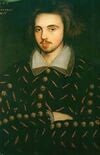Portal:Theatre
| Welcome to Uncyclopedia's Theatre portal. |
Theatre is that branch of the performing arts concerned with the creation of gainful employment for those persons who would normally just be shunned for having an irritating voice and exaggerated mannerisms. It is comprised of stories or narratives for (or with) an audience using combinations of acting, shouting, rude gestures, dull music, awkward dance, object manipulation, emotional manipulation, sound, spectacle, and drama — indeed, recycling and otherwise rehashing any one or more elements of the other similarly pretentious performing arts. In addition to standard narrative dialogue style, theatre takes such forms as opera, musicals, ballet, mime, kabuki, classical Indian dance, aboriginal and native Indian dance, modern white-people styled So You Think You Can Dance, Morris dancing, Chinese opera, Japanese opera, mummers' plays, and pantomime.
| More about Theatre... |
Selected article
Written for the Japanese stage by the 18th century Japanese author Gorluca, Nōgaku Sen no Rikyu ichi-go ichi-e Dengaku Shirabyoshi Gagaku ("War of Stars") was a smash hit with local villagers, spawned five sequels, and is mentioned as the original inspiration to George Lucas for the modern Star Wars franchise. With a minimalist acting crew of two males playing every character and a painted background, the play was relatively cheap to create. In spite of its advantages, the sequels were not as good as the originals, much to the dismay of the young Japanese males who waited in line fourteen hours to see them.
The actors are on stilts and in costume, manipulating puppet hands to simulate action, just like good action movie stars should. In the lead feature, Avatar, smurf sex is abundant.
The 3-act play is presented in its entirety below, translated from Japanese to Korean to Chinese, back to Japanese, and finally to English.
Selected picture
Did you know...
- Shakespearian drama is characterized by incoherent babble, but an occasional sexual metaphor can be found by a perverted student, or pointed out by an astute teacher attempting to gain the attention of a class?
News
- Abu Hamza to Appear in Theatre Production of Peter Pan
- Paul Freeman's acting career dead at 41
- Gellar announces latest acting attempt
- Actor Undergoes Emergency Pocket-Watch Related Surgery
- French mime artist dead, foul play suspected
- Actress portrays her own buttocks
- Man found dead in theatre showing G-rated movie
Selected biography
Christopher Marlowe is/was/will be one of the most prolific writers in human history, and is single handedly responsible for the authorship of close to six hundred million separate published works. With a body of works far exceeding those of any other poet or writer, he is widely regarded as mediocre in his talents, and questionable in his abilities, yet is attributed with some of the most famous sayings of all time.
Born sometime in the middle of the second millennium, Christopher Marlowe spent the first thirty years of his life as a playwright for the Elizabethan court, as well as an occasional writer for the People’s Court (what, you thought it was really unscripted?), where he garnered experience as a critical and commercial failure, the most valuable kind of experience for any writer.
Over time his earliest works have come to be appreciated as classics in their own right, however interestingly enough despite this recognition, no one in the modern world seems to have read them. In fact, most people cannot even name any of them (Think about it, can you? I didn’t think so). Some scholars have attributed this to the fact that all of Marlowe’s early plays were written in blank verse, and that if you leave the page blank, there’s really nothing to read. This would mean that Marlowe’s plays consisted of nothing but actors standing around doing and saying nothing for several hours, however scholars believe this to be an accurate representation of Elizabethan entertainment.
Categories
Opening Soon
A Midsummer Night's Dream • Ballet • Death of a Salesman • Dude, Where Art Mine Horse and Carriage? • Ein Reich! Ein Volk! Ein Act! • Hamlet • H.M.S. Potatore • Joseph and the Amazing Technicolor LSD Trip • Little Orphan Annie • Macbeth • Much Ado About Yokels • Othello • Riverdance • Romeo and Juliet • Star Wars (Japanese Opera) • The Phantom of the Opera (Play) • The Tempest • The Vagina Monologues •
Things you can do
Featured content
Main topics
History: Sanskrit Plays • Natya Shastra • Natya Shastra of Bharata • Koodiyattam • Bhasa • Kālidāsa • Kathakali • Bhavabhuti • Harsha • Chinese theatre • Cantonese Opera • Beijing Opera • Ramakien • Noh • Bunraku • Kabuki • Butoh • Theatre of Ancient Greece • Theatre of ancient Rome • Medieval theatre • Commedia dell'Arte • English Renaissance theatre • Restoration comedy • Restoration spectacular • Neoclassicism • Twentieth century theatre
Types: Comedy • Drama • Musical
Philosophy: Aristotle • Poetics • Konstantin Stanislavski • Antonin Artaud • Bertolt Brecht • Orson Welles • Peter Brook • Jerzy Grotowski • Meisner technique • Stanislavsky System • Method acting • Presentational acting
Organization: Community theatre • Dinner theatre • Fringe theatre • Summer stock theatre • Regional theatre • Off-Off-Broadway • Off-Broadway • Off West End • Broadway theatre • West End theatre
Unions: Actors Equity Association • Society of Stage Directors and Choreographers • International Alliance of Theatrical Stage Employees
Awards: Back Stage West Garland Awards • Drama Desk Award • Evening Standard Awards • Green Room Award • Hans-Reinhart-Ring • Helpmann Award • Joseph Jefferson Award • Laurence Olivier Awards • London Critics' Circle Theatre Awards • Lucille Lortel Award • Manchester Evening News • Matilda Award • New York Innovative Theatre Awards • Molière Award • Obie Award • Ovation Awards • Sangeet Natak Academy Award • Theatre Pasta Theatre Awards • Tony Award
Stagecraft: Theatre director • Playwright • Actor • productionProduction team • Set designer • Lighting designer • Costume designer • Sound design • Dramaturg • Stage management • Production manager • Technical theatre







